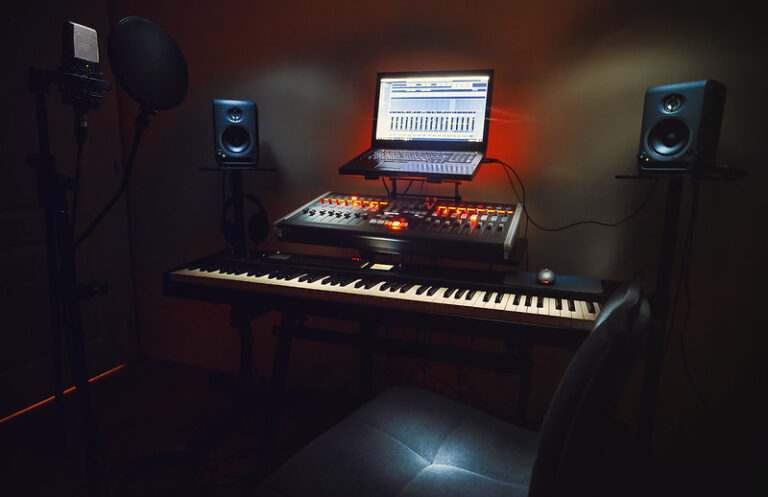How to Become a Singer – The Beginner’s Guide
Becoming a professional singer will take a lot of consistency and hard work, but it’s possible. By following a few basic steps that most singers follow to make it big, you can achieve your dream.
Getting into the singing industry will require a lot of practice, but it will also involve making connections and signing with the best record label. It’s essential to gain knowledge in both the singing department and the business department.
The following article outlines the most common career path steps you can take to become a professional singer. Your path might not follow the exact steps detailed below, but they outline good places to get started on your singing career.
Getting a Solid Start as a Professional Singer
The first step to becoming a professional singer is to know what you want and believe you can achieve it. Breaking into the singing industry as a new artist will take up a considerable amount of time and require much effort. However, if you are willing to make those sacrifices, it is possible.
But as important as having the talent and skills to do so are, you also need to make yourself known on the music scene as much as possible. The more exposure you have, the better your chances of climbing the ladder are.
Gain as Much Experience as Possible to Become A Singer
Most professional singers start by writing their songs and performing at open mic nights. Write two or three high effort songs that showcase your voice talent the most and perform them at any local places that hold open mic nights. Some sites that are good options to start at are:
- Bars
- Restaurants
- Coffee shops
- Clubs
- Volunteer organizations
Anywhere that has open mic nights is a great place to gain experience as an artist. Other great sites to gain experience are singing competitions and talent shows.
Singing competitions let you gain experience with performing and being in front of an audience. They have a competitive environment that enables you to put your singing skills to the test and see how you measure up with other possible competition. They can also be a great way to connect in the singing world and get advice from professionals.
Finally, talent shows are probably the best way to gain experience performing. If you find yourself getting nervous or anxious at the thought of performing in front of a crowd, then talent shows are a great place to start.
Talent shows can assist with getting you used to perform in front of a group in a more relaxed environment. Signing up for school or church talent shows is a fun way to get used to performing in front of people since you’re singing in front of people you already know, rather than strangers.
Sharpen Your Skills
Singing competitions and talent shows aren’t the only way to improve your skills as a singer and performer. While education and professional coaching are not required, getting a few voice lessons from an experienced voice teacher might be a good idea. They can teach you how to get the most out of your voice and some simple singing warm-ups to exercise it. Your vocal cords are your main instrument as singers, so it’s essential to take good care of them.
While voice lessons aren’t required for a singing career, knowing how to read and write music is. Especially if you are going to write your songs, learning how to write music correctly is essential to have a promising career. You can take a music theory class at a local college or a music workshop at a community center; any knowledge is better than no knowledge.
Singers also commonly know how to play an instrument, like guitar, to deepen their band’s sound. Learning how to play an instrument, in addition to having a good singing voice, will help you to stand out in the crowd and get noticed easier.
You can also learn how to dance if it’s appropriate for your genre. Learn skills based on what you want to do on stage.
Online Singing Courses With Looking Into:
- Masterclass featuring Christina Agulera
- Yousician
- uDemy “Extreme Vocals Course” (for hardcore music lovers)
Create a Unique Image
Besides honing your skills and getting as much experience as possible, creating a unique and authentic image is crucial for getting your start in the singing industry. Your image is an audience’s or record label’s first impression of who you are as an artist. A few things you can do to create a unique self-image include:
- Being authentic and consistent
- Identifying what makes your act unique
- Developing your image on social media
When it comes to your image, you should be doing anything except following instructions. Your self-image is how you let your audience know that you have something different to offer. It will also attract people who identify with your image and help you start building a fanbase.
Having a consistent image is also essential, as that is how your fans will resonate with you. There are so many bands in the world that being authentic in a way that stands out is how you get noticed. Don’t be afraid to try new things and have fun while creating your image as well.
An artist’s image goes all the way through your career. This topic includes the following:
- Your background
- Your clothing style
- The feeling of your music
- How you interact with fans
- How you handle interviews
Do you want to look edgy or inspiring? Check out this video below for another perspective:
Do whatever comes naturally to you while performing and run with it. Whatever it is, make sure it’s something that people haven’t seen before, and perform with it with pride.
Your Singer Image On Social Media (and Other Online Platforms)
This image should follow you on social media by posting important events in your career. For example, posting about upcoming shows and events draw attention to them. Do so in a conversational tone that will appeal to your authentic audience.
You can also create a portfolio or website is also a great way to develop your image. Think of your portfolio or website as being an interactive resume for talent scouts and record labels. They will be able to see your talent and experience all in one place.
Once you have a solid image and a polished act, the next step is to put yourself out there and let your talent speak (or sing) for itself.
How to Get Noticed as a new Singer
Getting noticed will take a lot of time and effort, but it’s possible if you stay committed. Following the tips below can help you get seen faster and send you on your way to a record deal faster.
Make Connections During Your Music Career
Making connections is very important in the music industry. Knowing the right people can be the difference between getting an opportunity or not, so it’s essential to make sure your connections are widespread.
You don’t need to be in a fancy office or studio to make connections. Casual conversations are also opportunities to make connections and get to know people who can help you in your career. As you start performing at gigs, no matter how big or small, strike up conversations with others who are performing with you. Get to know their music style, and if it’s something that clicks with you, talk about collaborations.
You can also mingle with your audience once your performance is over. You never know when you’ll meet a manager or record label representative that will help you out because they have a positive first impression of you.
The Importance of Following Up With Your Music Connections
Once you’ve introduced yourself, it’s a good idea to follow up with your connections, especially if they gave you their contact information. When you show that you’re interested and initiate the project, you seem committed to putting in the work to get the rewards.
Keep in mind that not every connection will lead to opportunities. Sometimes ideas or projects fall through and never happen. But don’t let it discourage you. Keep reaching out to find connections, and you’ll land an opportunity sooner or later.
Some of these connections may be lifelong friends or mentors. As a musician, it’s important to take opportunities but understand that everyone has value. “Connections” can often be lifelong friends.
Still, you’ll want to find the dealmaker when making connections. Here’s a video with some more tips:
Give as Much as You Get When Connecting With People
Connections are all about building mutually beneficial relationships. If someone gives you an opportunity, you help them with their career in return. You can do this in multiple different ways aside from just trading each other options. For example, if you’re talking to someone who writes music reviews, providing an exclusive first look at your newest music will give them something to write about and generate interest in their audience.
The interest they generate in their audience will drive them towards looking up more of your music. The situation is a win-win: you both get a larger and more engaged audience.
Connections and partnerships where both parties involved receive something for their efforts also tend to last longer. The more time you spend with a connection, the stronger your relationship grows. For instance, having a solid personal and professional relationship with a popular local band can lead to you opening for them at one of their shows.
Build a Large Audience By Collaborating With Other Bands
Having a large audience is essential because it will do half the work for you. If important people in the music industry see an audience of people who will support you, it will make them more likely to sign you. Besides growing your fanbase with your music, collaborating with other musicians is the best way to build an audience quickly.
Debuting your music is a great way to gain audience members that share the same music taste as you and enjoy your style. But playing to the same crowd of like-minded people isn’t going to grow your fanbase. The best way to reach new audiences is by introducing yourself to them by collaborating with bands with a larger (or different) fanbase.
There’s a reason slightly lesser-known musicians do opening acts for shows put on by more established singers. People are more likely to buy show or concert tickets for singers and acts they know and love.
An Example of How Singing With A Larger Band Works
A personal favorite example of this is Time, The Valuator’s cover of Lovely featuring Charlotte Buchholtz:
When you perform alongside established musicians, you’re exposing yourself to their audience and catching their interest. The more bands you collaborate with, the faster your fanbase will grow.
Another way you can build a larger audience is by connecting with popular bands online. Starring in one of their music videos or being featured in one of their songs is a great way to introduce yourself to new audiences.
Even better, you can also post your singing part or music video role to your social media and tag the band in the caption. This collaboration will link your social presences to each other, and people will know that you have talent since you’re associated with someone more famous.
Utilize the Internet To Spread The Word On Your Singing Journey
The internet makes it possible for you to share your talents in a much easier and faster way. Working a little smarter and not harder can help you get noticed in half the time if you play your cards right. For example, post regularly on a YouTube channel to share what it’s like to sing on tour.
You can also post videos of your performances at competitions and talent shows to your channel so record companies can see your potential as a professional performer. Utilize the internet to help you get noticed by featuring your abilities in other people’s demos. You don’t necessarily have to sing a solo, but assisting other musicians in creating background music or harmonization can let producers know that you can diversify.
While all of the steps so far are important, signing with a record label to make it big is another crucial decision you will have to make in your singing career.
Signing with a Record Label
The record label you choose to sign with should be a carefully thought-out decision. It can be a tricky one, but following the advice discussed below can be helpful.
How to Get Noticed by a Record Label
Before you sign with a record label, however, you must get noticed by one. Record label representatives don’t just sign anyone, so making a good impression with your music and personality is required. Starting conversations and connections with them is an excellent strategy to get noticed, but another good way to get a label’s attention is to send them your music.
Record labels more than likely get sent thousands of demos each day, so yours must stand out. You can make sure your demo gets noticed by:
- Sending it to labels that would be interested in your musical style
- Making sure your demo is high quality
- Get feedback from others
Here’s another video with some extra tips:
Tips When Selecting The Best Record Label
Whether it be pop or alternative, labels usually have a reputation for producing a few certain music styles. Because of this, you want to make sure that the label you’re sending your music to would be interested in your style. If your artistry isn’t of interest to the label, then it will waste both their time and yours.
Do some research about the label you want to send your music to. See what type of artists they have signed in the past and what music style they specialize in. Once you find a few labels that pique your interest, polish up your demo.
Sending Your Demos as a Singer to Record Labels
Music demos are short and sweet samples of your music that are quick to listen to but still give record labels a good idea of your style. A lot of demos tend to be from sample CDs on pre-purchased rhythms and sounds. This tactic is common enough that a record label will likely be able to tell if you’ve used one of these to create your demo.
If you take shortcuts like these, your chances of getting signed decrease significantly. The more authentic your music sounds, the higher your chances of getting signed are. This situation assumes you’ve got the talent to back up submitting your stuff to a label. Essentially, if you put in the effort, you will get the rewards.
If you still aren’t 100% sure about your demo, sending it to other musicians to get feedback. Send your demo to more established musicians you’ve collaborated with. They will have more experience in the industry and will most likely know what captures the record labels’ attention and pass that knowledge on to you.
If there is a recurring critique about your demo, then you’ll know what to fix before sending it in. Once a record label contacts you back saying they want to sign you, then the big decisions start.
How to Decide on a Record Deal
There are a lot of different aspects that go into deciding on a record deal, including:
- How much you will work
- The amount you will get paid
- How much creative control you will have
Here’s a short video on profiting from record labels:
These aspects can be discussed on a large or small scale depending on how big the record company is. More prominent record companies tend to draw out the deal set to their terms, meaning they will decide how much time you will put in for them. Unfortunately, this can mean their work schedule can be too much for you.
If it is, then make sure your voice is heard. Negotiate with the label how much is too much or too little, as it is ultimately your singing career. Smaller record companies tend to be more lenient and open to negotiations. So, if you would rather have that type of schedule, then starting small might be your best option.
It’s essential to be willing to communicate with record labels. Don’t put up with anyone who gives you the “this is your one shot” mentality. No matter how much you work, you will need to get paid for your time and talent.
Smaller companies usually don’t have as much funding, so you might not always get paid as often or as much as you want. This is the main drawback of a small record company, and your music might not get out to as many people as you might have hoped.
Avoiding Manipulative Record Companies
Regardless of how much you work and how much the record company will pay you, making sure you still have as much creative control as possible is essential. Most record companies tend to work from a business perspective, meaning that if they know a particular method works, they will apply it to each asset they can, in this case, singers.
This harmful situation is not the case for all of them, but you didn’t set out to become a singer to get molded into a copy of every other artist. Make sure the deal lets you have as much control over your music as possible. The contract should ultimately include equal parts of what you have to offer and what the company has to offer.
How to Maintain a Singing Career
Once you have kick-started your singing career, you must focus on maintaining it. Staying in the public eye can be difficult, but a few tips for doing so include:
- Promoting your music online and offline
- Diversifying your skills
- Creating a brand people can relate to
- Keep your voice healthy
This article has already discussed how to market your music online, but marketing your music and yourself offline is a great way to maintain relevance. For example, doing interviews for your local radio or television stations will bring you closer to the audience you are trying to reach, thus garnering more interest in your music.
Another way you can market your music offline is through merchandise. Most prominent artists make a good amount of money from having their merch sold in stores and online. If fans can show their support of you and your music, it will draw in more audience members and keep you in the public eye.
Diversify Your Skills When You Grow as a Singer
If your music career is still starting, diversifying your skills as a musician is a great way to keep you afloat. For example, making some extra money by giving voice lessons or teaching others how to play instruments will help you make money and keep your skills sharp.
If you have more experience, then helping to produce and support other young local artists can keep you going as well. Not only will it help you to make some money on the side, but it will also build you a reputation in your town as the person to go to for music promotion.
Always be Personable to Fans
While it is essential to create a unique image, as this article has previously discussed, you still want to show your audience that you’re a regular person on the inside.
Whenever you interact with your fans, being personable and likable will help you establish better relationships. The stronger your relationship with your fans, the more they will listen to your music and support you.
Remember to Take Care of Your Voice
Taking care of your singing voice is essential to maintaining a singing career. Since your voice is your primary instrument and makes you money, taking care of it can mean the difference between keeping and losing your job. Some artists cannot sing as well as they used to because they didn’t take care of their voice correctly.
Do not stretch yourself too far. Learning the proper singing techniques and keeping the rest of your body healthy will be most beneficial to maintaining your voice.
For example, resting your throat and drinking lots of fluids when you lose your voice will help keep your vocal cords in performing condition. Everyone also has limits to how loud or how high a note their voice can reach. Know your limits, and don’t go past them too often.
For more tips on not losing your voice, check out our sister article on this topic.
Final Thoughts on Being a Successful Singer
Having a successful and fulfilling career in the singing industry is possible if you put in the effort. The steps detailed above aren’t necessarily the perfect path, but they are a good blueprint to start.
Even if you follow the steps perfectly, there is no guarantee that they will get you into a record company’s office to sign a deal. It is ultimately up to you to put in the necessary amount of time and effort to make your singing dream a reality.
—
keep it on Bythebarricade.com for tons of punk rock interviews, reviews, articles, and photos! Also, “Like” By the Barricade on Facebook to never miss a post.









